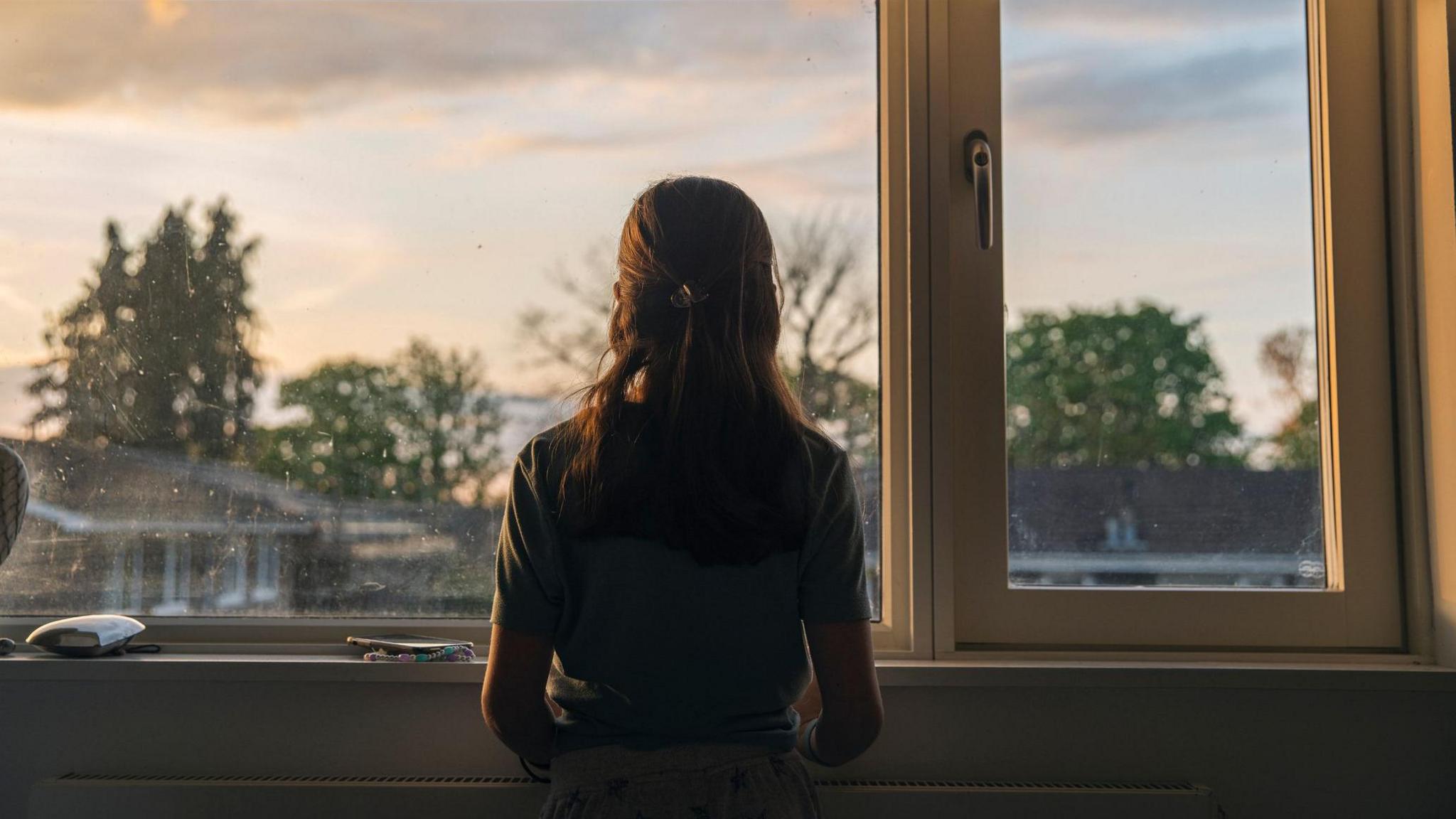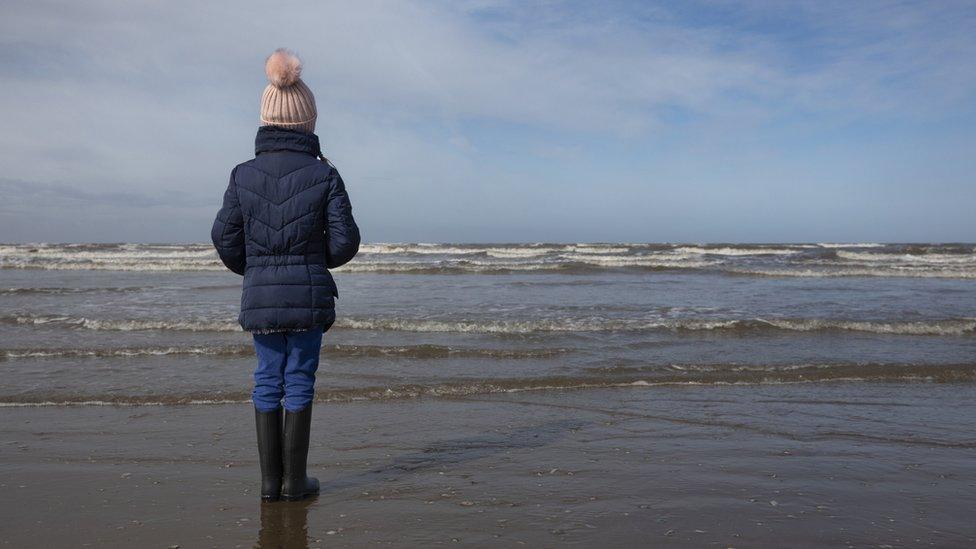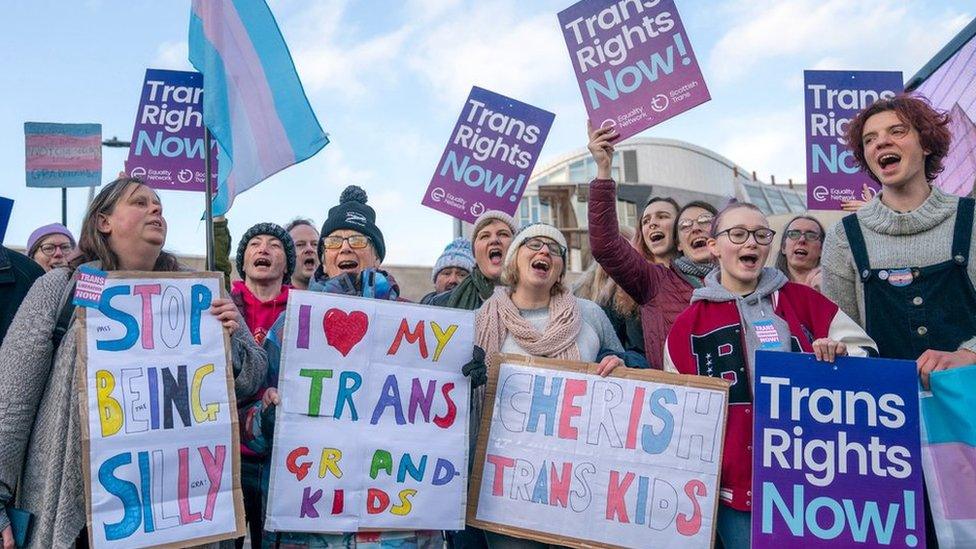What's happening with children's gender care in Scotland?

- Published
Changes have been made to gender identity healthcare services for young people in Scotland, following recommendations by the chief medical officer.
Prof Gregor Smith said his recommendations, which included halting the use of puberty blockers, were driven by a "real desire" to look at the scientific evidence, not by ideology.
He made these remarks to a Holyrood committee on children's gender identity healthcare, following the publication of the Cass review in England - which raised fears about the long-term effects of the drugs.
What has changed and why?
Dr Hilary Cass’s review into services in England and Wales was published in April, concluding that children had been let down by a lack of research and "remarkably weak" evidence on medical interventions in gender care.
A multi-disciplinary team commissioned by Scotland’s chief medical officer, Prof Gregor Smith, considered Dr Cass's findings while reviewing services in Scotland, and reported back in July.
Several recommendations were made, including formally pausing puberty blockers until further research has been carried out.
Then in September Scotland’s only service for under-18s at the Sandyford clinic in Glasgow closed.
Instead, care would be delivered within "age-appropriate" paediatric services across the country.
Public health minister Jenni Minto confirmed that puberty blockers will only be available as part of a UK-wide clinical trial, which NHS Scotland will join when it gets under way next year.
Campaign group Scottish Trans said it welcomed the commitment to improve services but that new guidance should recognise that changing gender could be a positive outcome for a young person.
The government has now accepted his recommendations in full, alongside new National Standards for Care published by Healthcare Improvement Scotland.
How many trans children are there in Scotland?
Like other parts of the UK, Scotland has seen a rapid rise in the number of young people questioning their identity or experiencing gender dysphoria.
In her report, Dr Cass said this was the result of a "complex interplay between biological, psychological and social factors".
For many, this will only require support from family, friends and school, but some become so distressed they seek medical help.
Scotland’s only specialist service for under-18s is currently based at the Sandyford clinic in Glasgow.
It stopped accepting new self-referrals in August and patients must now be referred through their GP.
Figures released to BBC Scotland news under a Freedom of Information request showed that at the end of 2023, 1,100 young people were on the waiting list for the Sandyford.
The longest wait was 1,692 days, about four-and-a-half-years.
In total, 1,077 young people have been seen at the Young Persons Service since January 2017. The number seen each year has fallen from a high of 314 in 2018 to just 90 last year.
The Scottish government says the clinic faces challenges recruiting staff because of the highly specialised nature of the work and the polarised climate around it.
Similar issues were identified in NHS England by the Cass Review.
Will Scotland follow Cass recommendations?
Dr Cass did not examine services in Scotland in her review, but following her report Prof Smith was asked to advise how it might apply to clinical services here. The government says it will adopt his 32 recommendations in full.
Like Dr Cass, he recommended expanding the capacity of gender healthcare for children and young people through a network of “age-appropriate" services distributed throughout the country.
Under-18s will be seen by specialists in paediatrics, with services run by local health boards with input from national experts.
Children will no longer be treated at the Sandyford, which is primarily an adult sexual health clinic, in central Glasgow.
A similar re-organisation has already begun in England following the closure of the Tavistock Centre in London, which was criticised by Dr Cass. Six new regional hubs for children’s gender services were announced in August, in addition to those already up and running at Great Ormond Street Hospital and Liverpool’s Alder Hey.
In Scotland, GPs will still be able to refer a child to gender services after an initial assessment, whereas in England referral must now come from mental health services or child health specialists in hospital.
Under the Scottish plans, each young person would be assigned a senior clinician responsible for their care, who would take the lead in ensuring services are safe.
The new services should take a multi-disciplinary approach, by addressing mental health and safeguarding needs, as well as any need for medical intervention.
Prof Smith says resources will need to be found to increase capacity, with specialist staff training and professional development to bolster the workforce.
The health watchdog Healthcare Improvement Scotland has also published new National Standards for Gender Identity Healthcare, including a commitment that under-18s will be screened for mental health and neurodevelopmental conditions such as autism during initial assessments for gender dysphoria.
Until the new model is in place, Prof Smith said care should be taken to make sure those already in the system had continuity of care, and to address the immediate challenges in meeting demand for the service.
Vic Valentine, the manager of Scottish Trans, welcomed the announcement that services would be redesigned.
They said: "Everybody agrees that children and young people are not currently getting the care they need, when they need it. It's absolutely vital that these services are improved."
But Vic Valentine said most trans people were still concerned about the ideas underpinning the Cass review.
"Reading the review, it gives the impression that Dr Cass thinks that transitioning, and being trans, is the worst outcome for a child or a young person. But being trans can be a really great thing if it's simply the truth of who you are.
"We want every child and young person to just get the outcome that's right for them."
Will children be given puberty blockers?
One of the most controversial issues for children and young people with gender incongruence is around prescribing puberty blockers, or cross-sex hormones which can be given after puberty.
Dr Cass said the lack of evidence on the long-term impact of taking hormone treatments from an early age had let children down.
She recommended that hormones should only be prescribed with "extreme caution", and NHS England announced that puberty blockers would no longer be routinely prescribed outside of clinical trials.
In April, Glasgow's Sandyford Clinic announced no new prescriptions would be started for its young patients, and it went further by also stopping new patients aged 16 or 17 receiving any hormone treatments until they were 18.
At the time, NHS Greater Glasgow and Clyde said that 43 patients who were already on a prescription would continue to receive either puberty blockers or "gender affirming hormones" such as testosterone or oestrogen.
NHS England now says it will begin research trials into puberty blockers early next year and Ms Minto said a team from NHS Scotland would join the UK-wide study.
But some disagreement has emerged among doctors about the ban on puberty blockers.
In July, their union the British Medical Association passed a motion criticising the policy, and the implementation of the Cass Review’s findings.
Its UK chair said some young people who could benefit from care were being denied it, and that the BMA would undertake their own evaluation of Cass’s findings.
But about 1,000 senior doctors have written to the BMA saying they are “extremely disappointed” with their union’s stance.
Professor Sir Graeme Catto, former chair of the General Medical Council was one of them.
He said: "It's that lack of evidence that's at the heart of this debate.
"We need to get a decent evidential base and therefore we need clinical trials. And to continue prescribing without knowing what you are doing seems to be ethically very dubious. And the BMA of all organisations should not be doing that."
Vic Valentine, from Scottish Trans, says that while they wait for those trial to take place, some young people will struggle.
"There are people who believe there is already enough evidence that [puberty blockers] are the right thing for some people. Even if you are a person who believes that more evidence is needed, we need to get to the point where that evidence exists," they said.
"The research needs to be ethical and involve young people in its design, and it really needs to happen as soon as possible. Because we are worried that there are young people right that need access to medication that would mean they could lead better, happier, healthier lives, and they can't access it here in Scotland."
- Published10 April 2024

- Published8 December 2023

- Published28 July 2022
